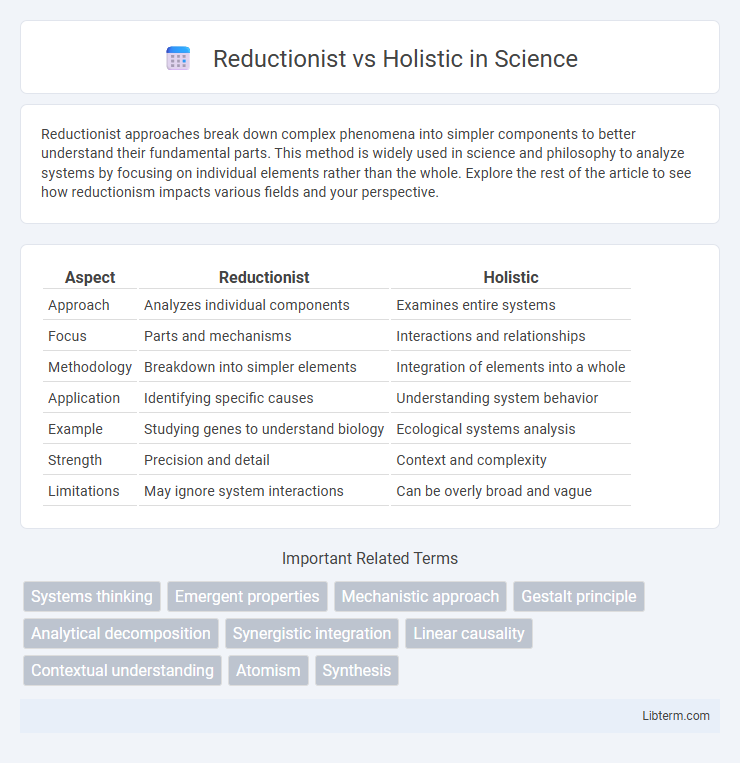Reductionist approaches break down complex phenomena into simpler components to better understand their fundamental parts. This method is widely used in science and philosophy to analyze systems by focusing on individual elements rather than the whole. Explore the rest of the article to see how reductionism impacts various fields and your perspective.
Table of Comparison
| Aspect | Reductionist | Holistic |
|---|---|---|
| Approach | Analyzes individual components | Examines entire systems |
| Focus | Parts and mechanisms | Interactions and relationships |
| Methodology | Breakdown into simpler elements | Integration of elements into a whole |
| Application | Identifying specific causes | Understanding system behavior |
| Example | Studying genes to understand biology | Ecological systems analysis |
| Strength | Precision and detail | Context and complexity |
| Limitations | May ignore system interactions | Can be overly broad and vague |
Introduction to Reductionism and Holism
Reductionism breaks complex phenomena into simpler components, emphasizing detailed analysis of individual parts to understand the whole system. Holism, in contrast, considers systems as integrated and interconnected wholes, asserting that the properties of the whole cannot be fully explained solely by its parts. These contrasting approaches influence diverse fields like biology, philosophy, and psychology, shaping how researchers interpret complex systems and phenomena.
Defining Reductionist Approach
The reductionist approach breaks down complex systems into their individual parts to understand the whole by analyzing each component separately. This method emphasizes isolating variables and studying cause-and-effect relationships at a micro level, often used in scientific research and diagnostic processes. By focusing on discrete elements, reductionism aims to simplify complexity but may overlook the interactions and emergent properties present in holistic perspectives.
Understanding the Holistic Perspective
Understanding the holistic perspective involves recognizing the interdependence of system components and their interactions within the larger context, which contrasts with the reductionist approach that isolates elements for study. Holistic methods emphasize system dynamics, emergent properties, and contextual factors to provide a comprehensive view unavailable through reductionist analysis alone. This perspective is essential for complex systems such as ecosystems, healthcare, and social sciences, where integration of multiple variables leads to more effective solutions and insights.
Key Differences: Reductionist vs Holistic
Reductionist approaches analyze complex systems by breaking them down into individual components to understand their functions independently, while holistic approaches emphasize the interconnectedness and interactions within the entire system. Key differences include the reductionist focus on isolated parts and linear causality contrasted with the holistic emphasis on systemic relationships and emergent properties. These contrasting views impact disciplines like medicine, psychology, and ecology by shaping diagnostic methods and treatment strategies.
Historical Development of Both Approaches
Reductionist approaches trace back to Ancient Greek philosophers like Democritus, who proposed that everything is composed of indivisible atoms, while this perspective gained prominence during the Scientific Revolution with figures such as Isaac Newton emphasizing mechanical explanations. Holistic thinking roots in Eastern philosophies and was further advanced in the 20th century by systems theorists like Ludwig von Bertalanffy, who introduced General Systems Theory to emphasize interconnectedness and complexity. Both approaches evolved through scientific paradigms reflecting shifts from analyzing isolated components to understanding integrated wholes in disciplines such as biology, psychology, and ecology.
Applications in Science and Medicine
Reductionist approaches in science and medicine focus on analyzing individual components, such as genes or molecules, to understand diseases and develop targeted treatments like precision medicine. Holistic methodologies emphasize the integration of biological systems, environmental factors, and patient lifestyles, leading to advances in systems biology and personalized health care strategies. Combining these perspectives enhances diagnostic accuracy, improves therapeutic outcomes, and promotes comprehensive disease management.
Advantages of Reductionism
Reductionism offers precise analysis by breaking complex systems into simpler components, enabling detailed understanding of individual elements. This approach facilitates scientific experimentation and reproducibility, allowing researchers to isolate variables and identify causal relationships. Reductionism streamlines problem-solving by focusing on specific parts, which can lead to targeted innovations and efficient technological advancements.
Benefits of Holistic Thinking
Holistic thinking enhances problem-solving by integrating multiple perspectives, leading to more comprehensive and sustainable solutions. It promotes interconnectedness, recognizing relationships between systems and fostering innovation through synergy. This approach improves decision-making in complex environments by emphasizing context, balance, and long-term impacts over isolated details.
Criticisms and Limitations of Each Approach
Reductionist approaches often face criticism for oversimplifying complex systems by isolating individual components, which can overlook emergent properties and interactions essential to understanding the whole. Holistic methods are criticized for potentially lacking scientific rigor and empirical measurability, making it difficult to validate findings or apply them systematically. Both approaches have limitations in addressing complexity, with reductionism risking fragmentation of knowledge and holism struggling with vague definitions and operational challenges.
Integrating Reductionist and Holistic Methods
Integrating reductionist and holistic methods enhances problem-solving by combining detailed analysis with broad context understanding. Reductionist approaches break down complex systems into components, while holistic methods emphasize system interconnections and emergent properties. This integration optimizes decision-making in fields like systems biology, medicine, and environmental science by leveraging both granular data and systemic insights.
Reductionist Infographic

 libterm.com
libterm.com